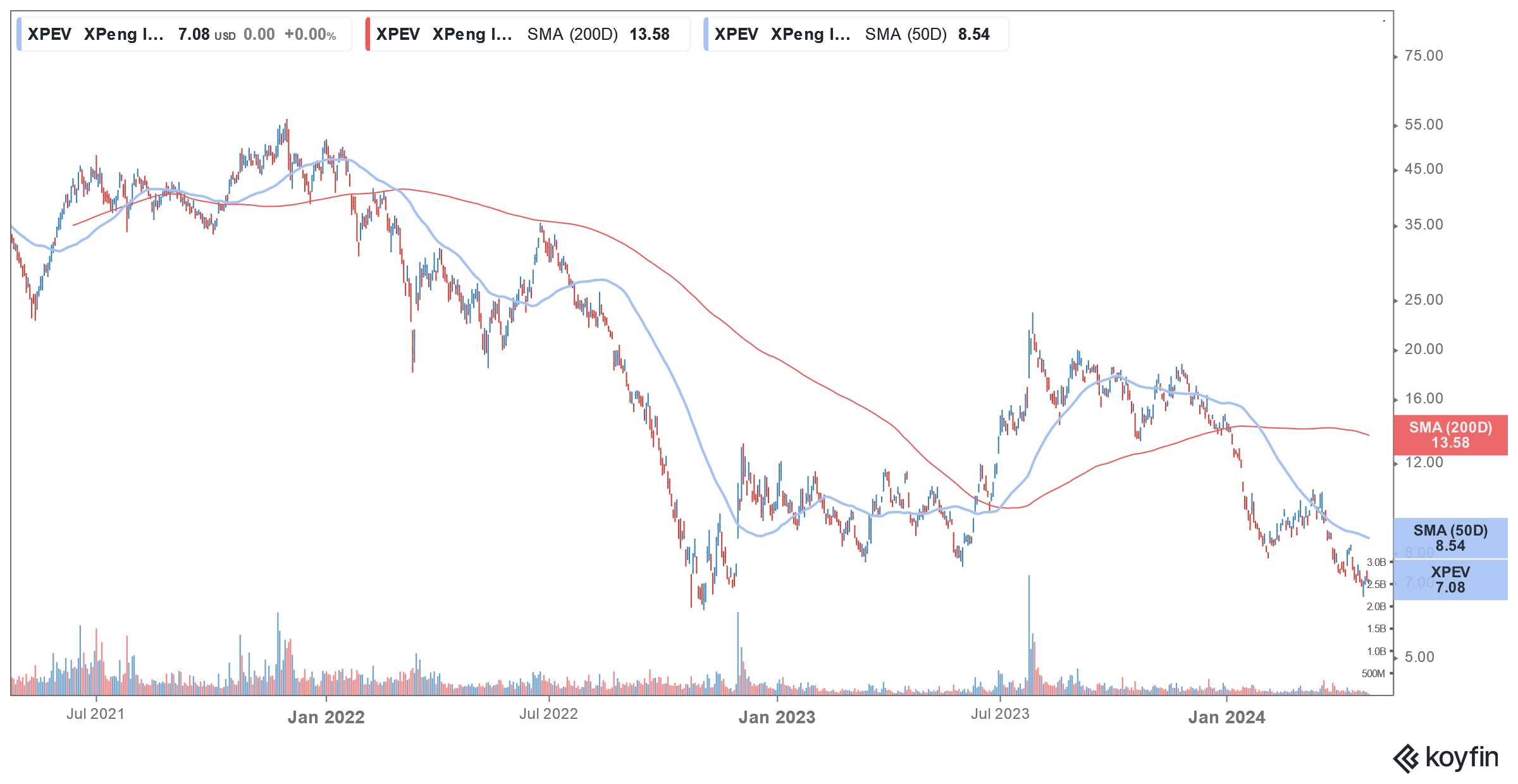Xpeng Motors Plans Overseas Production to Escape Tariffs
Please note that we are not authorised to provide any investment advice. The content on this page is for information purposes only.
Xpeng Motors is considering overseas production as the Chinese electric vehicle (EV) tries to escape regulatory heat and possible tariffs in Europe.
Speaking with reporters on the sidelines of the Beijing auto show, Xpeng Motors’ co-president Brian Gu said that currently the company exports a small number of its vehicles but it might reconsider its strategy amid the regulatory issues in Europe which is probing Chinese EV companies for the alleged subsidies they receive.
Gu said, “There’s no strategy that’s fixed in stone.” He added, “We have to work around what is required to compete there. Right now, we are making entries into markets with our products produced in China.”
XPEV Considers International Production
“It’s small quantities, initial steps, but we’re making products as local as we can. But, in the event that we need to make manufacturing or supply chains or other areas we need to invest in order to compete, we may have to do that,” said Gu
Currently, exports account for low single digits of Xpeng Motors’ deliveries but the company expects the contribution to rise to 10% this year.
According to Gu, “Maybe we have to localise, we have to build up the local industry… but it’s all in the name of helping the major trend of green transition – lowering the cost of it, accelerating the pace of that.”
Notably, amid slowing growth at home, Chinese EV companies have been looking at international markets, especially in Europe. NIO is also targeting an eventual entry into the US markets. Gu was however quite circumspect on entering the US market and said the “challenging environment” makes it tough to make “a bold entry plan.”
US-China relations have nosedived over the last couple of years and companies in both countries are finding it increasingly difficult to do business with each other.
Elon Musk on Chinese EV Companies
On multiple occasions, Tesla’s CEO Elon Musk has praised China’s manufacturing ecosystem and EV companies. Earlier this year during Tesla’s Q4 2023 earnings call, he said, “Frankly, I think if there are not trade barriers established, they will pretty much demolish most other companies in the world.”
In May last year, Musk termed China-based EV maker BYD “highly competitive.” In 2011, the billionaire had laughed at the possibility of BYD as a competitor to Tesla.
During Tesla’s Q4 2022 earnings call in January 2023, Musk said, “we have a lot of respect for the car companies in China. They are the most competitive in the world. That is our experience.”
He added, “They work the hardest and they work the smartest. And so, if I were to guess, probably some company out of China is the most likely to be second to Tesla.”
Previously also the billionaire praised Chinese workers for burning the 3 a.m. oil” while criticizing American workers for “trying to avoid going to work at all.”
To be sure, Chinese EV companies have proved their prowess and in Q4 BYD surpassed Tesla to become the biggest seller of battery electric cars. While Tesla reclaimed the title in Q1, it could be a short-lived victory as BYD’s Q1 sales were negatively impacted by the Lunar New Year Holidays in China.
Volkswagen Invested in Xpeng Motors
In July 2023, Volkswagen partnered with Xpeng Motors to build two EVs on its platform and also buy a stake in the company for a total consideration of $700 million. The two companies are also exploring joint sourcing options.
Rival Chinese EV company NIO also bagged a $2.2 billion investment from UAE’s CYVN Holdings in December, its second investment from the investment giant last year.
In the previous investment round in July, CYHN invested $738.5 million in newly issued shares of NIO and purchased another $350 million from Tencent, an existing NIO shareholder.
The deal between Xpeng Motors and Volkswagen was a pathbreaker for not only XPEV but also the Chinese EV ecosystem as it reflected the confidence of the German auto giant in a startup EV company. It was also a testimony to Xpeng Motor’s self-driving capabilities.
Xpeng Motors Self-Driving
Xpeng Motors has rolled out its XNGP driver assistance system to 243 cities a year ahead of schedule and plans to roll out the feature to Europe soon.
Notably, Xpeng Motors has been advancing its autonomous driving capabilities and in August it also acquired the self-driving assets of Chinese ride-hailing app Didi. As part of the $744 million deal, Didi took a 3.25% stake in Xpeng in exchange for its EV and autonomous driving assets.
Also, Xpeng would launch a new EV brand developed under the project name “MONA” and would produce vehicles in the mass market RMB150,000 price range.
Meanwhile, XPEV and other Chinese stocks are trading sharply higher today after data showed China’s GDP expanded at an annual pace of 5.3% in the first quarter which was ahead of estimates.






